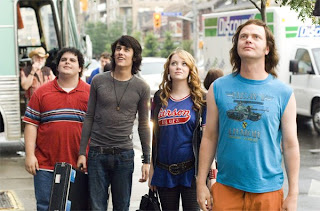My Discovery of Jack Kerouac and Friends
 By Murissa Shalapata
By Murissa ShalapataI am ashamed to admit that I have never read a single word of beat poetry from the '50s when it was in its prime. As part of my creative writing class I was assigned to write a beat poem of about 1-2 pages. I was absolutely dreading this assignment since I normally only get C's or a very low B- once, when I attempt poetry. At the same time as trying to purge poetry out of my imagination, I also have to read 4 books minimum and write an essay which is a whole other story in itself. However, one of these books is the very popular book called "On The Road" by Jack Kerouac.
At first I couldn't get into the short choppy sentences mixed with larger paragraphs full of beautiful descriptions of a feeling we may take for granted or something mundane appearing extraordinary to the character. 40 pages later I fell for Mr. Kerouac and his unique writing style that I had ignorantly passed by for so long.
I was inspired by his beat novel so I decided to do more research for my beat poem. Kerouac was just a gateway into more delectable treats for my imagination.
I was inspired by his beat novel so I decided to do more research for my beat poem. Kerouac was just a gateway into more delectable treats for my imagination.

I found names like Ginsberg (who has ties with Bob Dylan) and Whitman and they too provided wonderful inspiration for me. I was provided with an overall attitude to carry with me while I pulled lengthy lines out of my head, seemingly out of nowhere really. An attitude that the beatniks lived in all aspects of their lifestyle; To be against the establishment, for drugs, into jazz in smoky cafes or bars, appreciation for Eastern religions and they even birthed the reading of poetry aloud, among other ideas of course. I was finding poetry to be a wonderful thing all of a sudden and the beat generation resonated with me in a way that has only occurred with screenwriting. I also have been thinking that the short choppy sentences of the beat novel would suit screenwriting as you do need to get to the point in a clear fashion. My question to all of you who write screenplays is do you think you have a certain style of writing? If you write novels, can you define your aesthetic?


I've got 'On the Road' scheduled this year as part of a reading challenge, and I'm really looking forward to it. What always happens to me when I read a classic like that - I always find myself saying 'No wonder this was such a groundbreaker.'
ReplyDeleteI write poetry (I've got one up today on my blog, actually) and in university I wrote screenplays, and I have to say that my novel writing has suffered because of my sparse poetic/screenplay natural style. Critques always, always include 'I don't know how the character is feeling here.' LOL! I'm so used to leaving it out (for the actor to put in) that it feels unnatural for me to lay it all out in my novel writing. But I'm getting there.
The Beat Generation was certainly a powerful group. The focus on intellect and word play is really something else.
ReplyDeleteI'm not sure I can define my aesthetic yet, as I'm just now writing my fourth novel. My first three were light-hearted romantic women's fiction and now this third one seems to be shifting in tone considerably.
Screenwriting, which I have yet to dabble in, appeals to me because the focus is on the visual. I see my story ideas as movies and would find it much easier to write out stage directions than descriptive passages! Perhaps it's my years involved in plays that imbedded that desire in my subsconsious. *grin*
Great post!
Smiles,
Chiron O'Keefe
I took a play writing class with an actor for the stage and a writer himself. He taught me exactly what a play was and why plays shouldn't be made into movies, especially with actors from that play. You can see the awkwardness in History Boys and even Mamamia.
ReplyDeleteI am now better at writing screenplays because of that class and even better for writing for actors vs. stage actors. I had no idea that there was such a crucial difference between the two and I am definitely happy I took that course.
He taught me that in plays the important thing is actually what is not being said and the ecriture of the actors. In film, it is all about creating interesting film scenes but dialogue must be relevant of course unlike plays.
Interesting post Murissa. I used to write poetry - but I never thought it was any good. Frankly it's darn hard. I read a lot of poetry when I was working on a TV show a couple of years ago - about writing and love. It was a wonderful experience. I think my style in writing involves humour with emotion - given my journalism and film/TV background I tend to write to the point and in a more "talky" way. I agree with Julia - it's tough having to provide so much interior monologue -when you're used to writing for the visual medium.
ReplyDelete